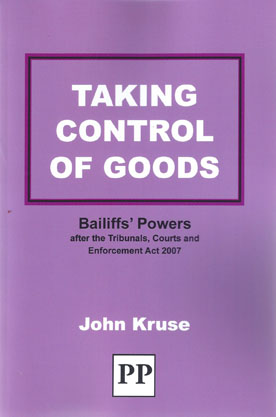Taking Control of Goods: Bailiffs' Powers after the Tribunals, Courts and Enforcement Act 2007 3rd ed
ISBN13: 9781858116044
Published: August 2014
Publisher: PP Publishing
Country of Publication: UK
Format: Paperback
Despatched in 5 to 7 days.
The new, third, edition was required in response to a major change in the legislation relating to enforcement of debt by seizure of goods, by bailiffs.
The Tribunals, Courts and Enforcement Act 2007 (TCEA) has substantially reformed the law and all practitioners in the field will require a revised handbook. As s.65(1) of the Act says, all previous common law rules on the exercise of powers are replaced by the powers created by Sch.12 of the Act. Much of the existing case authority and principles on these issues are replaced by a statutory code for those debts covered by the new Act.
In response to all these matters this text aims to provide a pragmatic step by step manual to assist those confronted with enforcement by seizure of goods under the new Act.
- The first part of the book puts the process of taking control of goods in its legal context and considers the impact of such general measures as public law and the Human Rights Act.
- The second part examines how enforcement action may be avoided, whether by negotiation or by the more extreme solution of insolvency.
- The third part goes through the procedure blow by blow, from the issue of a warrant to sale.
At each stage the parties’ rights and responsibilities are described, both in respect of the general principles of the law and in light of the particular debt being levied; remedies are discussed and issues of legal controversy are explored.
The book is designed for practitioners assisting the following groups:
- debtors: whether they are individuals, members of partnerships or limited companies;
- the debtor’s relatives: whether spouses, cohabitees, children or other family members who might find themselves involved in enforcement;
- tenants & lodgers of debtors (or their families);
- creditors;
- enforcement agents; or,
- third parties with an interest in property on the debtor’s premises, whether they are landlords, holders of bills of sale or debentures, trustees or liquidators in an insolvency, finance companies who have let property on lease or hire purchase, manufacturers with claims under retention of title clauses, other creditors of the debtor or any other third party whose goods might be threatened.
